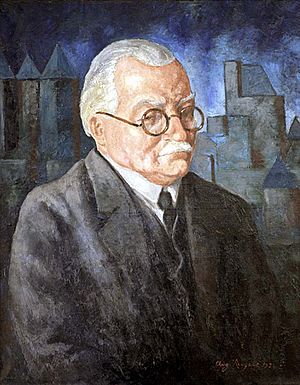Prosper Montagné facts for kids
Prosper Montagné (born November 14, 1865 – died April 22, 1948) was a very famous French chef. He lived during a time called the Belle Époque. He wrote many books and articles about food and cooking. One of his most famous books was Larousse Gastronomique (1938). This book is like a huge dictionary of French cooking.
Prosper Montagné was once as famous as his friend Auguste Escoffier. He was one of the most important French chefs in the early 1900s. In the 1920s, Montagné, Escoffier, and their friend Philéas Gilbert were highly respected. Many French writers saw them as the best chefs and food writers. After Montagné passed away, another chef called Alfred Guérot described them. He called them the "celebrated contemporary culinary trinity." He said Escoffier was "the father," Gilbert "the son," and Montagné "the spirit." This shows how much the French cooking world respected them.
Early Life and His Start in Cooking
Prosper Montagné was born on November 14, 1865. His full name was Paul Marius Octave Prosper. He was born in Carcassonne, a town in the south of France. This town is about 80 kilometers (50 miles) east of Toulouse. His father, Victor Germain Montagné, managed a department store. His mother was Clary Jeanne Roument.
After finishing high school, Prosper wanted to be an artist. He thought about studying architecture. But his parents had different plans for him. They bought an old hotel called L'Hôtel des Quatre-Saisons in Toulouse. Young Prosper started working in the hotel kitchen. At first, he was still more interested in painting than cooking.
Hoping to guide him, Prosper's father sent him away. He became an apprentice at the Hôtel d'Angleterre in Cauterets. This town is in southwestern France. There, he learned from Alphonse Meillon, a top chef of that time.
Becoming a Chef and Opening a Restaurant
By the time he finished his training, Prosper Montagné had found his true passion. He truly loved working in the kitchen. He then moved to Paris to work at famous restaurants. These included Ambassadeurs Restaurant and the Grand Hôtel.
Later, he worked at the Hôtel de Paris in Monte Carlo. There, he met his friend and helper, Prosper Salles. After this, he had to do his required military service. In 1900, he came back to Paris. He managed kitchens at Pavillon d'Armenonville and Restaurant Ledoyen. He also worked at the Grand Hôtel again.
In 1907, Montagné left his job as a chef. He wanted to focus on writing about food and cooking. In 1920, he decided to open his own restaurant. It was called Montagné Traiteur and was in Paris. Many famous artists, writers, and politicians visited his restaurant.
However, he had to close the restaurant in 1930 because of money problems. Soon after it closed, a writer named Leigh Hoffman wrote about it. She described it as a "small, quiet and dignified restaurant." She said it was well known to Americans. Hoffman wrote that Montagné did not offer a huge menu. Instead, he focused on a few perfect dishes. His goal was to keep the great cooking traditions of France alive. He always supervised every dish himself. From 1939 to 1945, he also worked as a cooking advisor. He helped La Rôtisserie de la Reine Pédauque in Paris.
See also
 In Spanish: Prosper Montagné para niños
In Spanish: Prosper Montagné para niños
 | Misty Copeland |
 | Raven Wilkinson |
 | Debra Austin |
 | Aesha Ash |


